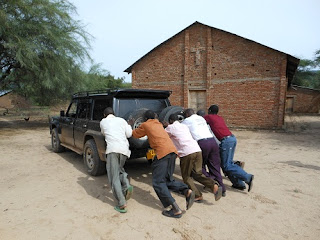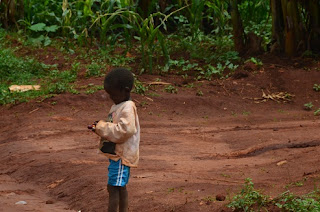Mlowa is located 1 hour and fifteen minutes to the northeast of Iringa. It is an emerging SACCOS rather than an existing one, like those we have visited previously. The villagers of Mlowa started talking about
having a SACCOS last year. Early in the
year Itiweni visited this village and talked with them about what a SACCOS was
and how to form one. They were very
excited about this and sent a letter to their companion congregation, Christus
Victor, asking if they would support them.
The letter they got back said, “YES!”
There was a lot of excitement and 108 people signed a list to get more
information and training. Then they sent
a letter to the diocese and waited and waited and waited. (It seems that the diocese assumed they would
contact us so did not say anything. They
assumed the diocese wanted them to wait so they did. Itiweni had told them to call her when they
wanted to start training and, with other things going on, had not called them
back.)
When we got to Mlowa the pastor was not there (he had to go
to another preaching point) so we met with the church treasurer. We, of course, had tea first. Tom spied some kids and so had to hand out
suckers.
Slowly the people gathered and the meeting began. Since this is an emerging SACCOS Itiweni
changed her course to focus on the basics of organizing and running a
SACCOS. There were 24 who attended this
meeting – half women and half men. We
emphasized the responsibilities and roles of the members and officers as well
as the role of savings and planning.
Overall we spent about two and one half hours presenting materials.
It was during the presentation that Tom’s candy habits came
home to roost. First one small boy, then
two, then three, then a whole group came creeping up to stare at Tom and make
faces. They of course wanted candy – but
the adults in the course and wanted no interruptions! A compromise was struck when Tom gave them
each one piece and they were told to shoo!
(Tom then started noticing the little kids that the mothers were holding
– so he soon had to get up and give them suckers!)
After the meeting we met with some of the members. Why I asked do you want a SACCOS, after all
Pride In Africa has a person here and there are some other groups around. “Pride In Africa charges 4% per month and
will only loan us money for 1 or 2 months (sometimes they will go three) so it
does not help the farmers. The other
groups in Mlowa are about the same. We
really need to have something to address the needs of the farmer.” I was told.
One of the evangelists, Dinas Mlowe, is a single woman
helping to support some of her nieces and nephews. “Rural areas need the opportunities for
borrowing that we can get from a SACCOS.
I have learned how to improve my farming from the CVP plot but I do not
have the capital to do it. This last
year I could only plant 1 acre of rice and some ground nuts.”
Mama Mchungaji (the pastor’s wife) said, “There is a lot of
knowledge that comes from the SACCOS training.
This will help the whole village do better. By giving the farmers the capital they need
to follow the CVP teachings the incomes will increase here and people will be
able to start other businesses. Our
children will benefit and our future will be brighter.”
Jonas Mukusa, father of four and one of the leaders of the
group told us, “Village people have nowhere to go to get the capital they
need. I have four acres to farm. I followed most of the CVP teachings on one
acre (he could not buy enough fertilizer so he skimped a bit) and only followed
the spacing rules on the other 3 acres.
On the CVP acre I got 25 bags of corn, on each of the other acres I only
got 13 bags of corn. I have one child I
am sending to school now and 2 more that want to go soon. I need to get a loan so I can farm the way I
know I should.”
We told them to hold
a meeting of those who were serious about joining a SACCOS (probably the 24 who
came plus a few others) and choose some leaders. Then send these people to our training
session next month. After this we told
them we would work with them to schedule some more training sessions with
Itiweni and work to get them started this year.
We were very pleased with this group. They have a good balance of men and women,
they did not want to do anything until they had the right training, and they
are all there for the right reasons. It
was a good day!
(PS-I hope you will forgive my paraphrasing of Itiweni’s
translation. Everyone of course spoke in
Swahili.)
The road to Mlowe is actually pretty good driving.
We were greeted by the pastor's wife and the church treasurer.
24 potential members gathered to meet with us.
The chickens had to check out the classroom before we got started.
Itiweni gave a lesson on what a SACCOS is, how to buy shares, voting and organizing, etc.
Earlier Tom had been giving the kids some suckers - so during the meeting these kids were creeping closer and closer wanting theirs!
Even this little one eventually got a sucker.
After the meeting some people wanted to meet with us to talk about why they want a SACCOS.
The evangelist wanted to follow the CVP lessons, but she could not get enough capital.
Mama Mchungaji wants her village to improve. "A SACCOS will bring hope for our children."
Jonas Mukusa knows how to increase his crops - he just needs to be able to borrow the capital to do it!











.JPG)

























.JPG)



















